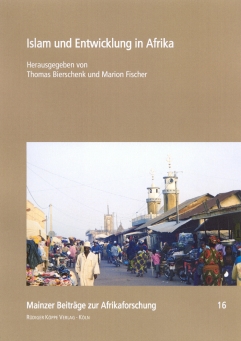
Islam und Entwicklung in Afrika
Edited by: Thomas Bierschenk, Marion Fischer. With contributions by: Thomas Bierschenk, Ruth Bigalke, Marion Fischer, Elvira Ganter, Heino Güllemann, Ursula Günther, Ulrich Rebstock, Julia Schlösser, Anja Söger, Katja Werthmann. Series edited by: Thomas Bierschenk, Anna-Maria Brandstetter, Raimund Kastenholz, Matthias Krings, Carola Lentz.
Series: MBA Mainzer Beiträge zur Afrikaforschung Volume 16
2007124 pp.
1 illustration, 2 figures, 6 tables
Text language(s): English, German
Format: 170 x 240 mm
280 g
Paperback
€ 34.80
Buy 'Islam und Entwicklung in Afrika' as a downloadable PDF document directly from our online shop »
Order 'Islam und Entwicklung in Afrika' as print edition »
Participative development today is realized in the developing world as not only the ethically fairest, but also as the most competitive way of progression. This assumption is based on the conviction that the project development can only succeed if the to be developed embrace it as stakeholders. However, this posit implies an ‘ethics of understanding the foreign’, which entails an antithesis. On the one hand the aim of overcoming the foreignness of the foreigners in their role of the to be developed is formulated, since development is understood as an adaptation to the developer. On the other hand this posit of participation claims to use the foreignness via participation for the very development.
The developmental collaboration with Islamic actors and organisations – as a topic of the present work – clearly shows the paradoxes of the participative approach and the ethics of intercultural foreignness understanding in general. The resulting dilemma-like act situations cannot be solved theoretically but have to be managed by practical compromises, which are described in this book from the point of view of developmental practices as well as scientists.
This miscellany contains contributions dealing with the Islam as a religion, with development as a political and economical project and with the relationship which may hold between this religion and the challenges of modern life in a globalized world. Development cooperation with Islamic actors and organizations highlights particularly clearly the paradoxes inherent in the participative approach and the ethic of intercultural relations. Also a specific context must be taken into account here, i.e. the laic understanding of the state that is characteristic of most African countries and is not basically challenged by Islamic groups.
CONTENTS
Abstracts
Thomas Bierschenk: Islam, säkularer Staat und partizipative Entwicklung in Afrika – eine Einleitung
Marion Fischer / Anja Söger: Die Beratungsstelle „Islam und Entwicklungszusammenarbeit in Afrika“ der Deutschen Gesellschaft für Technische Zusammenarbeit GmbH (GTZ)
Elvira Ganter: Islam und Gute Regierungsführung – wie wirksam sind die Ansätze der Entwicklungszusammenarbeit?
Katja Werthmann: Islam in Afrika – ein Überblick
Ulrich Rebstock: Democracy, Islamicity and Tribalism in Mauritania
Ursula Günther: Südafrikas Lesarten des Islam im Spiegel der Debatten um die Einführung des muslimischen Familien- und Personenstandsrechts
Julia Schlösser: Rechtspluralismus im Département Mayo-Sava im Norden Kameruns – ein Zusammenspiel von lokalen Rechtsvorstellungen, islamischem Recht und staatlich kodifiziertem Recht
Ruth Bigalke: Islam und Mädchenbildung in Guinea – oder Wer hat Angst vor Madame Bovary?
Heino Güllemann: Mali – muslimische Antworten auf HIV/AIDS. Anknüpfungspunkte für die Entwicklungszusammenarbeit
About the editors:
Thomas Bierschenk was Professor at the Department of Anthropology and African Studies at the Johannes Gutenberg University of Mainz where he is responsible for the focus area Cultures and Societies in Africa. His publications deal with a wide thematic spectrum containing state, politics, and development in Francophone countries in West and Central Africa.
Marion Fischer has been scientific officer at the University of Marburg. Since 1984 she has been working for the GTZ Gesellschaft für technische Zusammenarbeit. She has been director of the counselling centre for Islam and development cooperation in the GTZ centre from 2000 to 2006. Today she runs a program for participation oriented urban development in Cairo.
In our programme further monographs and paper collections on the topic Islam in Africa have been published, see the links below:
Review in “Portal für Politikwissenschaft”
Accompanying material:
- Heinrich Barth et l’Afrique
(ISBN 978-3-89645-220-7 ) - L’Islam béninois à la croisée des chemins
(ISBN 978-3-89645-817-9 )
Cross-reference:
- Heilige Stadt – Stadt der Heiligen
(ISBN 978-3-89645-824-7 ) - Les Fulbe du Boobola
(ISBN 978-3-89645-301-3 ) - Studies in Honour of Enno Littmann
(ISBN 978-3-89645-681-6 )
Reviews
Al Imfeld in Welt-Sichten, 8/2008, 29
In diesem Sammelband sind acht Vorträge aus einer Ringvorlesung zum Thema „Islam und Entwicklung aufbereitet“, die im Wintersemester 2004/2005 an der Universität Mainz durchgeführt wurde. Auffallend ist der hohe Anteil an Beiträgen, in denen – zumindest teilweise – verschiedene Entwicklungsprojekte der Gesellschaft für Technische Zusammenarbeit (GTZ) vorgestellt werden, so z. B. die GTZ-interne Beratungsstelle „Islam und Entwicklungszusammenarbeit in Afrika“, ein Projekt der Mädchenbildung in Guinea oder Landentwicklung im nördlichen Kamerun. Insofern verwundert es nicht, dass die Publikation seitens der GTZ finanziell gefördert wurde. Neben diesen eher praxisorientierten Beiträgen sind aber auch akademisch ausgerichtete Abhandlungen zu finden, etwa über Entwicklung und Eigenarten des Islams in Afrika oder Tribalismus in Mauretanien. Insgesamt gefällt der Band aufgrund seines breiten Themenspektrums; das Spannungsverhältnis „Islam und Entwicklung“ wird aus vielen Perspektiven beleuchtet, und die Schwierigkeiten, die aus der Zusammenarbeit mit muslimischen Entwicklungsträgern resultieren können, werden sachlich sowie überzeugend erläutert.
Jan Claudius Völkel in Portal für Politikwissenschaft, http://pw-portal.de/rezension/28458-islam-und-entwicklung-in-afrika_33531, 1
| « back | Print version | [top] |
 Books
Books Audio
Audio Biographies
Biographies Series
Series Festschrifts
Festschrifts Journals
Journals